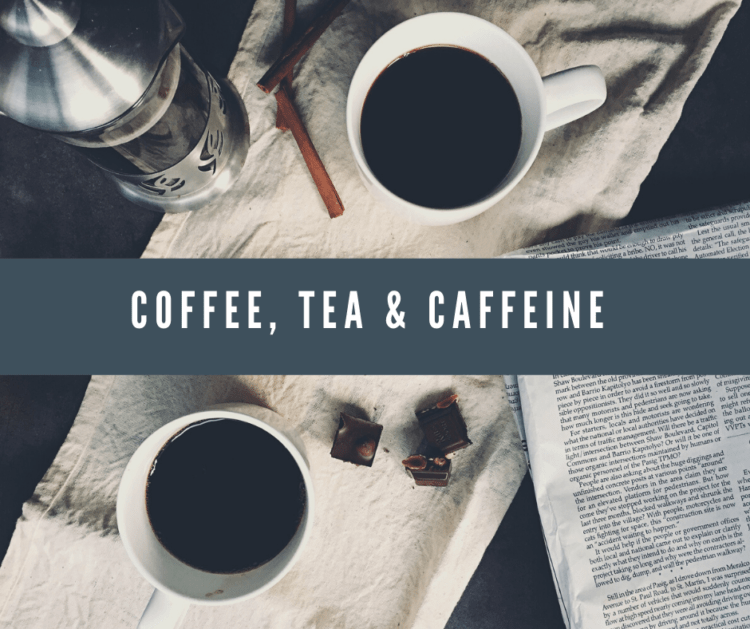Coffee, tea and caffeinated drinks like cola can make you feel energised and alert and even lift your mood. Coffee may also improve sports performance.
But for some, drinking just one cup of coffee in the morning can affect how you sleep at night. Caffeine may make you feel exhausted but you may still find it difficult to sleep (wired but tired)
It may also increase symptoms of anxiety and contribute to cravings for sugar and more caffeine.
Or you may find it difficult to recover from exercise.
Genetics
Caffeine is metabolised by your gut and your liver.
Your genes determine whether you are a fast, normal or slow metaboliser of caffeine.
If you are a fast metaboliser, you may find that you could drink coffee all day long and it doesn’t feel anxious or jittery or seem to affect your sleep patterns at all.
Your mood, memory and energy levels may be improved and it may also help to balance your blood sugar.
However, if you are a slow metabolizer, caffeine can spike your levels of the stress hormone cortisol. And just one cup of coffee may make you feel jittery and exacerbate anxiety.
It may also give you heart palpitations, make you feel sweaty and even cause panic attacks.
If you are a slow metaboliser around 50% of the caffeine from your coffee will still be in your system up to 12 hours later. You will probably already know if this is you…
Caffeine Pros and Cons
Pros
There is some evidence to suggest that for some individuals, green tea and coffee may reduce fasting blood glucose levels and glucose absorption which can be beneficial for weight loss.
Caffeine may increase the lifespan in some people and help to reduce the risk of cancer, stroke, diabetes, depression, gallstones, Parkinson’s disease and dementia.
Studies have also shown that tea (black, green, oolong) have inflammation-fighting properties.
Green tea is thought to be the healthiest tea due to its high levels of antioxidants and anti-inflammatory properties.
Drinking caffeine in the morning may also be beneficial to support your circadian rhythm (wake/sleep cycle) by helping to block a compound made in your body (adenosine) that makes you feel sleepy. And if you suffer from constipation, coffee can help to relieve this by stimulating digestion.
Cons
If you are experiencing prolonged periods of stress, caffeine may also increase your stress hormones to a level that exceeds your coping capacity.
In this situation, caffeine can increase inflammation in your body and therefore your risks certain conditions including type 2 diabetes and high blood pressure.
It may also contribute to sleep deprivation, low mood, poor brain function, obesity, poor digestion, hormonal imbalances, and compromised immune system function.
Drinking a cup of coffee later in the day can shift your circadian clock by about 40 mins and disrupt sleeping patterns.
In menopause, caffeine may increase hot flushes and affect sleep quality
High caffeine intake may also have side effects such as anxiety, stomach upset, insomnia, headaches, dehydration, shakiness, and heart palpitations.
You may not absorb some essential nutrients effectively. Some of these include iron, zinc, potassium, magnesium, B vitamins, vitamin D, calcium and vitamin C.
Coffee and tea plants can be heavily sprayed with pesticides. They are also acidic (especially coffee) For those with a sensitive stomach, the chemicals and acidity may cause damage.
Coffee is also a seed that contains a certain level of toxicity, naturally, to defend and protect the plant. Some people react poorly to these chemicals as well as the toxins present in the process of producing coffee or decaffeinating it. This can cause irritation to your gut and result in pain and digestive issues.
If you have celiac disease or non-celiac gluten sensitivity you may also be sensitive to coffee. The reason for this is that the molecular structure of coffee and gluten are similar.
Caffeine and Fasting/Time-restricted Eating
Some people drink coffee whilst fasting/time-restricted eating. It is currently not clear whether this affects your blood sugar and so breaks the fast but there is evidence that even when drinking coffee/tea whilst fasting there are still some positive benefits of fasting.
A word on decaf…
Coffee beans are steamed to dissolve the caffeine. The beans are then washed using an organic solvent called methylene chloride which is used in paint strippers and has a whole bunch of potential health risks…
The low down
Caffeine can be anti-inflammatory or inflammatory depending on your own genetics and lifestyle.
Regardless of whether you’re a slow or fast caffeine metaboliser, I recommend that caffeinated energy drinks and fizzy drinks be avoided. They contain artificial colourings, chemicals, preservatives and sugar all of which can contribute to inflammation. They do not have any health benefits and can also be detrimental to bone health and nutrient absorption.
- Drinking tea or coffee in the morning can support your natural sleep/wake cycle.
- For some people, caffeine can help with memory, focus, alertness and improve mood. It may also support weight loss and reduce the risk of certain diseases.
- I recommend drinking tea or coffee before midday to avoid caffeine affecting your sleep.
- Avoiding tea or coffee with meals may help to maximise nutrient absorption. This may be especially important for you if you know your iron levels are low or you need to support your bone health.
- Coffee can help to improve symptoms of constipation. If used in this way, I suggest also drinking a glass of water before drinking your coffee to avoid dehydration.
- If you are under prolonged stress drinking coffee or tea or caffeinated drinks may increase stress hormones and so may be worth avoiding.
- To avoid chemicals choose real organic coffee. Sometimes it’s the ritual of having a hot drink that makes us drink coffee or tea so why not try non-caffeinated herbal teas or rooibos.




